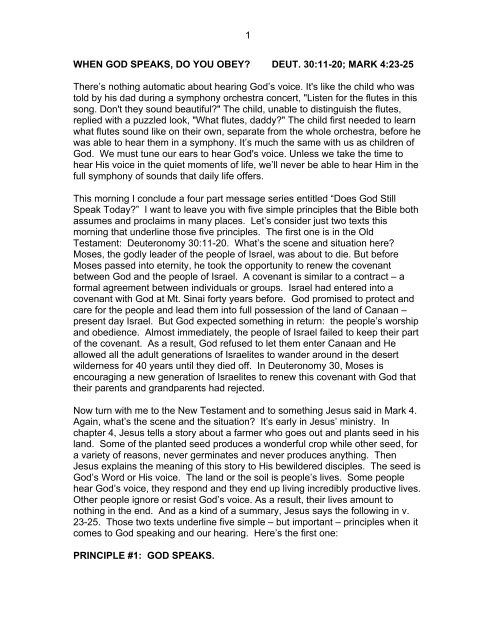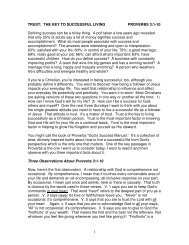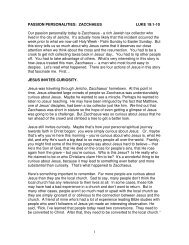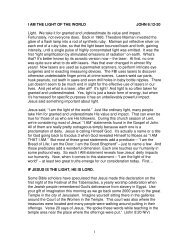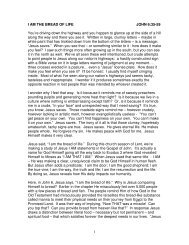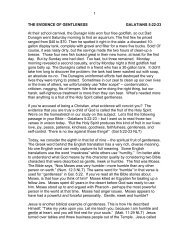1 WHEN GOD SPEAKS, DO YOU OBEY? DEUT. 30:11-20; MARK 4 ...
1 WHEN GOD SPEAKS, DO YOU OBEY? DEUT. 30:11-20; MARK 4 ...
1 WHEN GOD SPEAKS, DO YOU OBEY? DEUT. 30:11-20; MARK 4 ...
You also want an ePaper? Increase the reach of your titles
YUMPU automatically turns print PDFs into web optimized ePapers that Google loves.
1<br />
<strong>WHEN</strong> <strong>GOD</strong> <strong>SPEAKS</strong>, <strong>DO</strong> <strong>YOU</strong> <strong>OBEY</strong>? <strong>DEUT</strong>. <strong>30</strong>:<strong>11</strong>-<strong>20</strong>; <strong>MARK</strong> 4:23-25<br />
There’s nothing automatic about hearing God’s voice. It's like the child who was<br />
told by his dad during a symphony orchestra concert, "Listen for the flutes in this<br />
song. Don't they sound beautiful?" The child, unable to distinguish the flutes,<br />
replied with a puzzled look, "What flutes, daddy?" The child first needed to learn<br />
what flutes sound like on their own, separate from the whole orchestra, before he<br />
was able to hear them in a symphony. It’s much the same with us as children of<br />
God. We must tune our ears to hear God's voice. Unless we take the time to<br />
hear His voice in the quiet moments of life, we’ll never be able to hear Him in the<br />
full symphony of sounds that daily life offers.<br />
This morning I conclude a four part message series entitled “Does God Still<br />
Speak Today?” I want to leave you with five simple principles that the Bible both<br />
assumes and proclaims in many places. Let’s consider just two texts this<br />
morning that underline those five principles. The first one is in the Old<br />
Testament: Deuteronomy <strong>30</strong>:<strong>11</strong>-<strong>20</strong>. What’s the scene and situation here?<br />
Moses, the godly leader of the people of Israel, was about to die. But before<br />
Moses passed into eternity, he took the opportunity to renew the covenant<br />
between God and the people of Israel. A covenant is similar to a contract – a<br />
formal agreement between individuals or groups. Israel had entered into a<br />
covenant with God at Mt. Sinai forty years before. God promised to protect and<br />
care for the people and lead them into full possession of the land of Canaan –<br />
present day Israel. But God expected something in return: the people’s worship<br />
and obedience. Almost immediately, the people of Israel failed to keep their part<br />
of the covenant. As a result, God refused to let them enter Canaan and He<br />
allowed all the adult generations of Israelites to wander around in the desert<br />
wilderness for 40 years until they died off. In Deuteronomy <strong>30</strong>, Moses is<br />
encouraging a new generation of Israelites to renew this covenant with God that<br />
their parents and grandparents had rejected.<br />
Now turn with me to the New Testament and to something Jesus said in Mark 4.<br />
Again, what’s the scene and the situation? It’s early in Jesus’ ministry. In<br />
chapter 4, Jesus tells a story about a farmer who goes out and plants seed in his<br />
land. Some of the planted seed produces a wonderful crop while other seed, for<br />
a variety of reasons, never germinates and never produces anything. Then<br />
Jesus explains the meaning of this story to His bewildered disciples. The seed is<br />
God’s Word or His voice. The land or the soil is people’s lives. Some people<br />
hear God’s voice, they respond and they end up living incredibly productive lives.<br />
Other people ignore or resist God’s voice. As a result, their lives amount to<br />
nothing in the end. And as a kind of a summary, Jesus says the following in v.<br />
23-25. Those two texts underline five simple – but important – principles when it<br />
comes to God speaking and our hearing. Here’s the first one:<br />
PRINCIPLE #1: <strong>GOD</strong> <strong>SPEAKS</strong>.
2<br />
Both Moses and Jesus assume that God speaks to us, don’t they? Moses is a<br />
bit “in your face” about it, actually. “Now what I am commanding you today is not<br />
too difficult for you or beyond your reach. It is not up in heaven, so that you have<br />
to ask, ‘Who will ascend into heaven to get it and proclaim it to us so we may<br />
obey it?’ Nor is it beyond the sea, so that you have to ask, ‘Who will cross the<br />
sea to get it and proclaim it to us so we may obey it?’ No, the word is very near<br />
you; it is in your mouth and in your heart so you may obey it.” (Deut <strong>30</strong>:<strong>11</strong>-14<br />
NIV) Jesus is a bit more subtle, but His assumption is exactly the same. “‘If<br />
anyone has ears to hear, let him hear. Consider carefully what you hear…’”<br />
(Mark 4:23-24 NIV) Of course, God speaks. Of course, God has a voice. The<br />
Bible is utterly clear about this matter. God is a Person who loves to<br />
communicate with His creatures and does so in a variety of ways. God has<br />
spoken and still speaks to us in His Word, the Bible. God has spoken and still<br />
speaks to us in dreams, visions, nature, signs and wonders, through angels, in<br />
circumstances, through other people, and in inner promptings or leadings of the<br />
Holy Spirit. The real question is not, “Does God still speak today?” The real<br />
question is “Are you listening?” Just because you don’t hear God speak to you<br />
doesn’t mean that God isn’t speaking to you. It’s far more likely that the problem<br />
is that your spiritual ears aren’t attuned to God’s voice. Let’s move on….<br />
PRINCIPLE #2: <strong>GOD</strong> <strong>SPEAKS</strong> IN ORDER TO ACCOMPLISH HIS PURPOSES.<br />
That’s definitely an assumption by both Moses and Jesus. God had called out<br />
the people of Israel for a specific purpose: to be the channel of God’s revelation<br />
and salvation for the rest of the world. That’s why God had spoken to them. In<br />
Jesus’ story, the purpose of the seed – God’s Word or His voice – is to produce<br />
spiritual fruitfulness. “‘Others, like seed sown on good soil, hear the word, accept<br />
it, and produce a crop—thirty, sixty or even a hundred times what was sown.’”<br />
(Mark 4:<strong>20</strong> NIV) It’s important to remember why God speaks to you. Yes, of<br />
course, God often speaks to us in order to bring comfort, reinforce a wonderful<br />
truth or provide a necessary perspective. But God’s ultimate purpose is not to<br />
amuse or entertain you. It’s not even to guide you, to lead you or to help solve<br />
your problems in life. God doesn’t exist to help you find a job, get a spouse,<br />
have more money, enjoy better health or figure out your future plans.<br />
His purposes are always and forever about redeeming a lost world to Himself by<br />
drawing you and others to Himself. He wants to build His Kingdom and He wants<br />
to use you to help build it. He wants to transform your life in every way possible.<br />
If you’re just trying to hear God for selfish, self-centered reasons, you’ll be<br />
disappointed. If your life isn’t devoted to His purposes, why should God speak to<br />
you much at all? Are you here to do God’s will or do you think God exists to do<br />
your will? Are you just trying to use God to advance your own projects and plans<br />
in life? If so, don’t expect to hear God speak much into your life.<br />
The sad reality is that very few human beings really want to hear what God has<br />
to say to us. The fact is that we rarely want to listen to His voice unless we get
3<br />
into serious trouble or until we’re faced with a difficult decision. But if you’re a<br />
person who sincerely wants to hear God’s voice, you’re just as eager to hear<br />
from Him when life is uneventful and kind of dull. Let me ask you, do you seek<br />
God’s voice only when life’s circumstances become uncomfortable? On the one<br />
hand, your failure to hear His voice when you want might be due to the fact that<br />
you don’t in general want to hear it, but only when you think you need it. On the<br />
other hand, when your life is truly devoted to doing God’s will first and foremost,<br />
He has every reason to speak to you and He will.<br />
PRINCIPLE #3: TRULY HEARING <strong>GOD</strong> MEANS <strong>OBEY</strong>ING <strong>GOD</strong>.<br />
Can you hear God’s voice and ignore it, reject it or twist it? Of course, it happens<br />
every day all over the world! Even as followers of Jesus indwelt with the Holy<br />
Spirit, it probably happens in your life and mine more often than we would care to<br />
admit. Both Moses and Jesus assume that you have a kind of choice in how you<br />
hear God’s voice. Moses says, “No, the word is very near you; it is in your mouth<br />
and in your heart so you may obey it. See, I set before you today life and<br />
prosperity, death and destruction.” (Deut. <strong>30</strong>:14-15 NIV) He points out the<br />
wonderful benefits of doing whatever God wants you to do. Then, he spells out<br />
the dire consequences of hearing God’s voice but not doing what God says to<br />
do. Again, Jesus said, “‘If anyone has ears to hear, let him hear. Consider<br />
carefully what you hear…’” (Mark 4:23-24 NIV) You make the choice to hear<br />
God authentically and correctly. The bottom line? Truly hearing God means<br />
obeying God. That’s how you prove that you have truly heard the voice of God.<br />
However God might speak into your life – a Bible verse He impresses on your<br />
mind, a divinely orchestrated circumstance, a piece of advice from a godly friend,<br />
a gentle leading of the Holy Spirit you receive in a time of prayer – it will likely<br />
require you to adjust yourself to God. It will not be about God adapting Himself<br />
to your plans and desires. It’s impossible to truly hear God and then obey God<br />
without making some kind of adjustment or change in your life. I think of Jesus’<br />
story about the prodigal – or the lost – son. There was that hungry, dirty young<br />
man living with a bunch of pigs after squandering his inheritance on prostitutes<br />
and parties. How did Jesus put it? “‘When he finally came to his senses, he said<br />
to himself, “At home even the hired servants have food enough to spare, and<br />
here I am dying of hunger! I will go home to my father and say, ‘Father, I have<br />
sinned against both heaven and you, and I am no longer worthy of being called<br />
your son. Please take me on as a hired servant.’” So he returned home to his<br />
father….’” (Luke 15:17-<strong>20</strong> NIV) The voice of God spoke into that young man’s<br />
life and he obeyed! Truly hearing God always means that you obey God.<br />
PRINCIPLE #4: DIS<strong>OBEY</strong>ING <strong>GOD</strong>’S VOICE INVITES DISASTER.<br />
Both Moses’ challenge and Jesus’ story underline that truth clearly. Moses tells<br />
the people of Israel and us, “But if your heart turns away and you are not<br />
obedient, and if you are drawn away to bow down to other gods and worship
4<br />
them, I declare to you this day that you will certainly be destroyed….” (Deut.<br />
<strong>30</strong>:17-18 NIV) In his story about the four kinds of soil, Jesus makes it clear that<br />
three kinds of soil – or three ways of disobeying God’s voice – end up in disaster.<br />
When you disobey God’s voice you invite disaster upon yourself. That’s a<br />
principle that runs through the whole of Scripture. I wish that even God’s people<br />
would realize the truth of that principle to a greater degree than we do. Let’s talk<br />
about money and sex, for example! What does the Bible say about money? In<br />
general, it says work faithfully to earn a living. Learn how to live within your<br />
means. Manage and save your money responsibly. Avoid debt like the plague.<br />
Return to the Lord as a beginning minimum the tithe or 10% of your income.<br />
Have enough extra to help those in need. And yet over the years as a pastor,<br />
I’ve seen so many Christians ignore God’s voice in the area of money. As a<br />
result they invite financial disaster upon themselves which often leads to other<br />
disasters in other areas of life. What does the Bible say about sex? It’s God<br />
great and beautiful creation reserved for a husband and a wife. Sex outside of<br />
marriage is not an alternative lifestyle choice according to God; it’s disobedience<br />
to His voice. Yet again, I’ve seen too many Christians over the years listen to the<br />
voice of our culture rather than the voice of God in this area of sex and they invite<br />
disaster into their lives – spiritual, relational, emotional and physical disaster.<br />
Disobeying God can have other disastrous effects. Did you know it can increase<br />
the probability that God will stop speaking to you? God is a Person and many of<br />
the laws of relationship apply to your relationship with Him as well. If you’re<br />
speaking to someone and he or she persistently and stubbornly ignores you,<br />
what do you do? You stop speaking to him or her! You conclude it’s a waste of<br />
time and energy. May I suggest that an entrenched, rebellious, stubborn attitude<br />
towards God’s voice invites Him to stop speaking into your life? I actually think<br />
Jesus alludes to that possibility in Mark 4. He says there, “‘Consider carefully<br />
what you hear,’ he continued. ‘With the measure you use, it will be measured to<br />
you—and even more. Whoever has will be given more; whoever does not have,<br />
even what he has will be taken from him.’” (Mark 4:24-25 NIV) I’ve thought the<br />
last part of that passage refers to giving God our time, our talents and our<br />
treasure, but I wonder now if Jesus was in fact referring to this whole matter of<br />
hearing and obeying God’s voice. In other words, if you listen to the voice of God<br />
and obey it, you will start to hear it more. But if you resist His voice by ignoring<br />
or rejecting it, even the little that you still hear from God will be taken from you.<br />
What could be a greater disaster then God no longer speaking to you?<br />
Pastor and author, Henry Blackaby, writes about the first funeral he ever<br />
conducted. It was for a beautiful three year old little girl. She was dearly loved<br />
by her family, but she was spoiled. He’d observed how she loved to ignore her<br />
parents’ instructions. When they told her to come, she would run away. When<br />
they told her to sit down, she’d stand up. Foolishly, her parents thought her<br />
behavior was cute and they’d just laugh at her disobedient antics. One day the<br />
gate in their front yard was left open accidently. The little girl took off at full
5<br />
speed through the gate towards the street. To their horror Mom and Dad saw a<br />
car racing down that road towards her. They both screamed at their little girl to<br />
stop. She paused for a moment, laughed gleefully, and then turned and ran<br />
directly into the path of that oncoming car. “‘Today I have given you the choice<br />
between life and death, between blessings and curses. Now I call on heaven and<br />
earth to witness the choice you make. Oh, that you would choose life, so that you<br />
and your descendants might live! You can make this choice by loving the LORD<br />
your God, obeying him, and committing yourself firmly to him. This is the key to<br />
your life….’” (Deut. <strong>30</strong>:19-<strong>20</strong> NLT)<br />
PRINCIPLE #5: <strong>OBEY</strong>ING <strong>GOD</strong>’S VOICE INVITES BLESSING<br />
Obeying God’s voice – we do what we hear Him say – is the choice we all need<br />
to make every day. Obedience to the voice of God invites His blessing. Moses<br />
says, “For I command you today to love the LORD your God, to walk in his ways,<br />
and to keep his commands, decrees and laws; then you will live and increase,<br />
and the LORD your God will bless you in the land you are entering to possess….<br />
(Deut. <strong>30</strong>:16 NIV) Jesus tells us about the one soil that produced a bumber crop.<br />
In other words, blessing everywhere! Submissiveness to God’s voice invites God<br />
to continue to speak into your life. Jesus says, “‘With the measure you use, it will<br />
be measured to you—and even more.’” (Mark 4:24 NIV)<br />
Just a clarification about that word “blessing”, however. Yes, in general, if you<br />
obey the voice of God, you will probably have less problems and enjoy a happier<br />
life overall. But, we have a human tendency when we hear that word – “blessing”<br />
- to equate it with no problems, no challenges, great health all the time, ever<br />
increasing financial wealth, and everything going our way. Blessing, from a<br />
biblical perspective, is all wrapped up with whatever advances the Kingdom of<br />
God in this world, not what makes life easy and pleasant for us. Last week we<br />
looked at how Saul (who changed his name to Paul) and Barnabas – two early<br />
Christian leaders – heard the voice of God along with other leaders. The Bible<br />
says, “…the Holy Spirit said, ‘Set apart for me Barnabas and Saul for the work to<br />
which I have called them.’” (Acts 13:2 NIV) So, off they went to share the<br />
message of Jesus with lost people in cities and communities in what are now the<br />
countries of Cyprus, Turkey and Greece. What an incredible blessing!<br />
If you’ve read the book of Acts, you know the rest of the story, don’t you? In<br />
some places, Paul and Barnabas were warmly embraced and lives were<br />
transformed, but in other areas people weren’t thrilled by them at all and these<br />
two faithful servants of Jesus were persecuted. In one city, Paul was almost<br />
stoned to death. Meaning what? The blessing and the reward is in knowing that<br />
God is using you to further His kingdom and release His grace into this world.<br />
Don’t ever buy into the idea that everything God prompts you to do will be<br />
uncomplicated or low cost. Sometimes God will ask you to carry heavy loads<br />
and He’ll call you into difficult assignments. To put it another way, obeying God<br />
isn’t always easy, or fun or pleasant. But it is, nevertheless, always a blessing.
6<br />
When God speaks into your life and asks you to do something for Him, it will<br />
often mean some kind of giving up: your agenda, your finances, your priorities,<br />
your comfort. Sometimes the safe and the predictable have to be given up. This<br />
is what a life fully surrendered to God looks like. Obeying the Holy Spirit will lead<br />
you into places you’ve never been, challenge you in ways you’ve never been<br />
challenged and invite you into levels of sacrifice you never dreamed you would<br />
make. Why do it, then? Because you love Jesus! Also, it’s the knowledge that<br />
you’re helping to build what’s most important and what will never end - the<br />
Kingdom of God. It’s the promise that God will indeed reward all those who have<br />
not just heard His voice but have obeyed that voice fully and freely.<br />
At age five or six, Aaron McManus, began to ask his dad, Erwin, a pastor, "What<br />
does God's voice sound like?" Erwin didn't know how to answer. A few years<br />
later, Aaron went off to his first junior high church camp. In the middle of the<br />
week, Erwin went up to see the kids from the church. He learned that his son,<br />
Aaron, had started a fight with another kid but had been held back by his friends.<br />
He was unrepentant and wanted to leave camp. He’d pulled together his stuff<br />
and shoved it into the car. Erwin suggested they talk before driving away. Father<br />
and son sat on two large rocks in the middle of the woods. "Aaron," Erwin asked,<br />
"is there any voice inside you telling you what you should do?" "Yes," he nodded.<br />
"What's the voice telling you?" "That I should stay and work it out." "Can you<br />
identify that voice?" "Yes," Aaron said immediately, "It's God." It was the moment<br />
his dad had waited for. "Aaron, do you realize what just happened? You heard<br />
God's voice. He spoke to you from within your soul. Forget everything else that's<br />
happened. God spoke to you and you were able to recognize him.”<br />
Aaron's response was: "Well, I'm still not doing what God said." Erwin explained<br />
to him that that was his choice, but this is what would happen. If he rejected the<br />
voice of God coming from deep within and chose to disobey his guidance, his<br />
heart would become hardened, and his ears would become dull. If he continued<br />
on that path, there would be a day when he would never again hear the voice of<br />
God. But if he treasured God's voice however it came to him—through the<br />
Scriptures, through his conscience—and responded to him with obedience, then<br />
his heart would be softened, and his ears would always be able to hear the<br />
whisper of God into his soul. Aaron chose to stay. It was a critically important<br />
decision. If he had chosen differently, he would have begun walking down the<br />
path toward nominal discipleship. Perhaps he never would have rejected the<br />
Christian faith overtly. He might have even still attended church faithfully and be<br />
considered a good man by most. But he would begin to lose the ability to discern<br />
the voice of God and the precious relationship that goes with it.<br />
Oh! Give me Samuel’s ear, An open ear, O Lord, Alive and quick to hear, Each<br />
whisper of Thy Word; Like him to answer to Thy call, And to obey Thee first of all.


